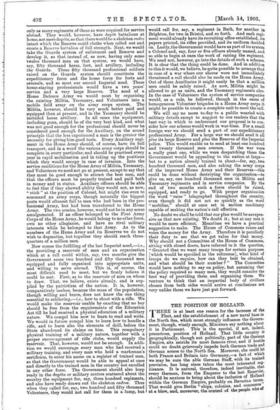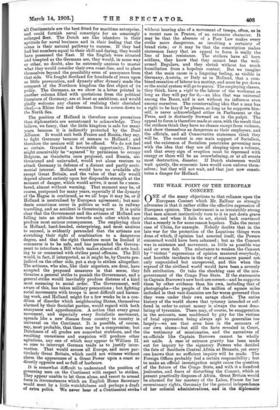THE POSITION OF HOLLAND.
'T 'HERE is at least one reason for the increase of the Fleet, and the establishment of a new naval base in the North Sea, which must strongly influence the Govern- ment, though, wisely enough, Ministers say nothing about it in Parliament. This is the special, if not, indeed, precarious, position of Holland. That little country is geographically, though not politically, part of the German Empire, sits astride its most famous river, and if hostile could no doubt grievously impede both German trade and German access to the North Sea. Moreover, she could let both France and Britain into Germany,—a fact of which we may be sure the able German Staff, with its trained prevision, has long since taken the most interested cog- nisance. It is natural, therefore, indeed inevitable, that every German, from the Emperor to the last Reservist, should be anxious to bring about the inclusion of Holland within the German Empire, probably on Bavarian term; That would give Berlin "ships, colonies, and commerce at a blow, and, moreover, the control of the people who of an Continentals are the best fitted for maritime enterprise, and could. furnish naval conscripts for an amazingly enlarged fleet. The Dutch are like islanders in their aptitude for naval business and in their feeling that the ocean is their natural pathway to success. If they had had but numbers equal to their skill and. daring, they would have possessed the East. If the English were situated and tempted as the Germans are, they would, in some way or other, no doubt, also be extremely anxious to master what they would consider their own coast-line, and to place • themselves beyond the possibility even of annoyance from that side. We fought Scotland for hundreds of years upon as little provocation, and dynasty after dynasty made the conquest of the Northern kingdom the first object of its policy. The Germans, as we show in a letter printed in another column filled with quotations from the political literature of Germany, are at least as ambitious, and would. gladly welcome any chance of realising their cherished ideal,—a Rhine free and German from its source down to the North Sea.
The position of Holland is therefore more precarious than diplomatists are accustomed to acknowledge. They believe, we fancy, that the little kingdom is safe for many years because it is indirectly protected by the Dual Alliance. It would suit both Prance and Russia, they say, to fight Germany because of menace to Holland ; and therefore the menace will not be offered. We do not feel so certain. Granted a favourable opportunity, France might conceivably be " squared " by permission to occupy Belgium, as Gambetta once proposed, and Russia, un- threatened and uninvaded, would not alone venture to attack Germany in defence of a distant and. partly senti- mental interest. Holland would have no available ally except Great Britain, and the value of that ally would depend almost entirely upon her disposable strength at the moment of danger, Which would arrive, it must be r3mem- bered, almost without warning. That moment may be, of course, postponed for many years, especially if the dynasty of the Hague is continued, as we all hope it may be, or if Holland is neutralised by European agreement ; but acci- dents sometimes occur in politics as well as in railway travelling, and an accident is threatening now. It is quite clear that the Government and the artisans of Holland are falling into an attitude towards each other which may produce most serious consequences. The employing class in Holland, hard-headed, enterprising, and most anxious to succeed, is evidently persuaded that the artisans are stretching their right of combination to a dangerous degree, and that the right therefore must be limited if commerce is to be safe, and has persuaded the Govern- ment to introduce a Bill which makes almost all acts lead- ing to or connected with strikes penal offences. The Bill would, in fact, if interpreted, as it might be, by Courts pre- judiced on the other side, put a stop to strikes altogether. The artisans, who also, like their superiors, are dour, have accepted the proposed. measures in that sense, they threaten a general strike to punish the Government, and a general strike would. inevitably produce distress of a kind most menacing to social order. The Government, well aware of this, has taken military precautions ; but fighting social movements with troops is most difficult and harass- ing work, and Holland. might for a few weeks be in a con- dition of disorder which neighbouring States, themselves alarmed by their Socialist parties, would. regard with both annoyance and apprehension. A notion that every great movement, and especially every Socialistic movement, spreads like a new disease from country to country is universal on the Continent. It is possible, of course, nay, most probable, that there may be a compromise; but Dutchmen of all grades are somewhat stubborn, and the resulting uneasiness and suspicion will produce other agitations, any one of which may appear to William. II. so sure to interrupt German trade as to justify inter- vention. That would arouse all Europe, and more par- ticularly Great Britain, which could not witness without alarm the appearance of a Great Power upon a coast so directly opposite and so full of harbours.
It is somewhat difficult to understand the position of governing men on the Continent with respect to strikes. They appear unable to let them alone, and. resort to armed force in circumstances which an English Home Secretary would meet by a little watchfulness and perhaps a draft of extra police. We never hear of a Continental strike without hearing also of a. movement of troops, often, as in a recent case in France, of an extensive character. It may be that the absence of a Poor Law makes every strike more dangerous, as involving a certainty of bread riots ; or it may be that the conscription makes statesmen fancy that an appeal to force is really the line of least resistance. The strikers have all been soldiers, they know that they cannot beat the well- armed Regulars, and they shrink without too much humiliation from a hopeless contest. But we imagine that the main cause is a lingering feeling, as visible in Germany, Austria, or Italy as in Holland, that a com- bined cessation of labour is a mutiny, and. must be put down or the social system will go to pieces. The employing classes, they think, have a right to the labour of the workman as long as they will pay for it,—an idea that was universal among the Boers, and is not without its influence even among ourselves. The countervailing idea that a man has a right to be lazy if he pleases, so long as he supports him- self, is never acknowledged either in Parliament or the Press, and is distinctly frowned on in the pulpit. The appeal to force is therefore made at once, with the result that the strikers think they have no chance except from violence, and show themselves as dangerous as their employers, and the officials, and all Conservative statesmen think they will be. The contest is one main support of Socialism, and the existence of Socialism penetrates governing men with the idea that they are all sleeping upon a volcano, and that every sign of eruption must be repressed with energy or there will be an overwhelming, or at all events most destructive, disaster. If Dutch statesmen would. wait quietly, the economic laws would soon enforce them- selves ; but they will not wait, and that just now consti- tutes a danger for Holland.











































 Previous page
Previous page